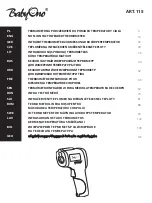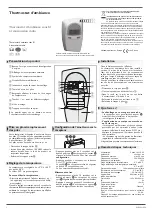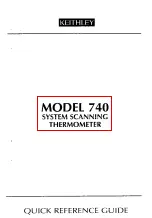
2
1
FIELD OF VIEW
CHAMP DE VISEE
ABTASTBEREICH
DISTANCE & SPOT SIZE
DISTANCE ET TAILLE DU POINT
ENTFERNUNG UND
MESSFLECKGRÖSSE
Distance: Sensor to object (inches)
3.6
0.3
8
2
50
4
100
D:S Nominal 10:1
6
150
92
20
500
40
1000
60
1500
Distance: Sensor to object (mm)
Spot Dia.
(mm)
Spot Dia.
(Inches)
CAMPO VISUAL
CAMPO DI VEDUTA
DISTANCIA Y TAMAÑO DE LA
ZONA DE MEDICIÓN
DISTANZA E DIMENSIONE DEL
PUNTO
MEASUREMENT TECHNIQUES
Locating a Hot Spot: To find a hot spot, use a scanning technique.
Aim the thermometer outside the area of interest, then scan across
with an up and down motion until you locate the hot spot.
Field of View: The target area must be at least as large as the spot
size. In the diagram above, Object 1 is the correct distance from
the unit. Note the target is slightly larger than the spot size being
measured. Object 2 is too far away.
Distance & Spot Size: To ensure accurate temperature readings, the
distance from the target must be correct. The further the distance
from the target, the larger the spot size as above.
Reminders
◆
Measure surface temperature only. To measure internal
temperatures of liquids or food, stir contents and point unit into
open container.
◆
Avoid thermal shock. Allow 30 minutes for unit to adjust to
large changes in ambient temperature. Do not store unit below
freezing.
◆
Close in on your target. The smaller the target, the closer you
should be to it. Refer to the D:S diagram above.
◆
Do not subject unit to excessive heat or cooling by holding it too
close to target.
◆
Measuring shiny surfaces. Not recommended for use in measuring
shiny or polished metal surfaces (stainless steel, aluminium etc).
TECHNIQUES DE MESURES
Localiser un point chaud : Pour trouver un point chaud, utiliser une
technique de balayage. Effectuer un balayage vertical jusqu’à ce
que le point chaud soit localisé, en commençant en dehors de la
zone d’intérêt.
Champ de visée : La zone cible doit être au moins aussi grande que
la taille du point. Dans le schéma ci-dessus, l’objet 1 se trouve à la
bonne distance de l’unité. Il faut remarquer que la cible est
légèrement plus grande que la taille du point mesuré. L’objet 2 est
trop éloigné.
Distance & taille du point : Pour s’assurer que les lectures de tem-
pérature sont précises, la distance entre la cible et le thermomètre
doit être correcte. Plus la cible est éloignée, plus la taille du point
est grande, comme ci-dessus.
Rappels
◆
Ne mesure que la température de surface. Pour mesurer la tem-
pérature interne de liquides ou d’aliments, mélanger le contenu
et pointer le thermomètre vers un récipient ouvert.
◆
Eviter les chocs thermiques. Allouer 30 minutes au thermomètre,
pour qu’il s’adapte à d’importantes fluctuations de température
ambiante. Ne pas stocker l’unité au-dessous de zéro.
◆
Rapprocher le thermomètre de la cible. Plus la cible est petite, plus
le thermomètre doit en être près. Se référer au schéma D:S ci-dessus.
◆
Ne pas exposer à des températures excessives en le tenant trop
près de la cible
◆
Mesurer des surfaces brillantes. Il n’est pas recommandé de mesurer
des surfaces brillantes ou en métal poli (acier inoxydable, aluminium,
etc.).
MESSTECHNIKEN
Aufspüren lokaler Extremtemperaturen: Um eine lokale
Extremtemperatur aufzuspüren, verwenden Sie die Abtasttechnik.
Richten Sie das Thermometer auf einen Bereich außerhalb des
interessierenden Bereiches und tasten Sie dann mit einer Auf- und
Abwärtsbewegung langsam den gewünschten Bereich ab, bis die
Extremtemperatur gefunden ist.
Abtastbereich: Das Zielobjekt muß mindestens so groß wie der
Meßfleck sein. Im obigen Diagramm hat Objekt 1 den richtigen
Abstand vom Gerät. Beachten Sie, daß das Zielobjekt etwas größer
ist als der Meßfleck. Objekt 2 ist zu weit entfernt.
Abstand und Meßfleckgröße: Um genaue Temperaturmessungen
zu erhalten, muß der Abstand vom Zielobjekt korrekt sein. Je
größer der Abstand vom Zielobjekt, um so größer ist der Meßfleck,
siehe oben.
Hinweise
◆
Das Gerät mißt nur die Oberflächentemperatur. Zur Messung
der inneren Temperatur von Flüssigkeiten oder Lebensmitteln
rühren Sie den Inhalt um und richten Sie das Gerät in den offe-
nen Behälter.
◆
Vermeiden Sie einen Temperaturschock. Das Thermometer
benötigt eine Zeitdauer von 30 Minuten, um sich an größere
Schwankungen der Umgebungstemperatur anzupassen. Das Gerät
nicht bei Temperaturen unter dem Gefrierpunkt aufbewahren.
◆
Das Thermometer muß sich möglichst nahe am Meßobjekt
befinden. Je kleiner das Zielobjekt ist, desto näher sollte das
Thermometer sein. Siehe Skizze Distanz:Meßfleck oben.
◆
Das Gerät keiner übermäßigen Erwärmung oder Abkühlung
aussetzen, indem es zu dicht an das Zielobjekt gehalten wird.
◆
Messung reflektierender Oberflächen. Messungen an glänzen-
den oder polierten Metalloberflächen (Edelstahl, Aluminium
etc.) werden nicht empfohlen.
TÉCNICAS DE MEDICIÓN
Localización de un punto caliente: Para localizar un punto
caliente, utilizar una técnica de barrido. Apuntar el termómetro
hacia fuera del área de interés, entonces hacer un barrido de arri-
ba hacia abajo hasta que localice el punto caliente.
Campo visual: La diana debe ser al menos del mismo tamaño que
la zona de medición. En el diagrama de arriba, el objeto 1 está a
la distancia correcta de la unidad. Fijarse en que la diana es lig-
eramente mayor que la zona de medición. El objeto 2 está demasi-
ado lejos.
Distancia y tamaño de la zona de medición: Para asegurar una lec-
tura exacta de la temperatura, la distancia de la diana debe ser
correcta. Cuanto más larga sea la distancia de la diana, mayor es la
zona de medición, como se muestra arriba.
Recordar
◆
La unidad mide solamente la temperatura superficial. Para
medir temperaturas internas en líquidos o alimentos, remover el
contenido y apuntarl a unidad hacia el recipiente abierto.
◆
Evitar un cambio brusco de temperatura. Conceder 30 minutos
para que la unidad se ajuste a cambios grandes en la temper-
atura ambiental. No almacenar la unidad en lugares a temper-
atura bajo el punto de congelación.
◆
Acercarse a la diana. Cuanto más pequeña sea la diana, más
cerca de ella debe estar usted. Ver diagrama D:S arriba.
◆
No aproximar el aparato demasiado a la diana, ya que esto lo
someterá a un calor o frío excesivos.
◆
Medición de superficies brillantes: No se recomienda su uti-
lización para medir superficies de metal brillantes o pulidas
(acero inoxidable, aluminio, etc.).
TECNICHE DI MISURAZIONE
Localizzare un Punto Caldo: per trovare un punto caldo, usate una
tecnica di scansione. Mirate col termometro fuori dell’area di
interesse, scrutate la zona con un movimento in alto e in basso
fino alla localizzazione del punto caldo.
Campo di Veduta: la zona dell’obiettivo deve essere almeno
grande quanto la dimensione del punto. Nel diagramma di cui
sopra, l’Oggetto 1 è alla distanza giusta dallo strumento. Notare
che l’obiettivo è leggermente più largo della dimensione del
punto da misurare. L’Oggetto 2 è troppo distante.
























